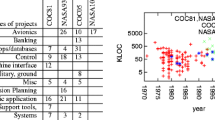Abstract
This paper examines the use of a linear model in combination with a multi-objective optimisation. A simple linear model is constructed and trained using data that has been automatically transformed based on skewness. These transformations, and their inverse, can then be used on the test data without having to make any assumptions of the underlying distribution of this data. Using nsga2, the coefficients of the linear model are optimised across a pareto front using 3 objective functions, representing 3 different error measurements. Although nsga2 produces a variety of non-dominated models across the pareto front, we show that the use of these models for creating an ensemble is inappropriate. Our main conclusion is that the use of pareto modelling for creating ensemble methods does not appear to be valuable, although there is some information that can be gained from examining the change in coefficient values of a linear model across the pareto front.
Access this chapter
Tax calculation will be finalised at checkout
Purchases are for personal use only
Preview
Unable to display preview. Download preview PDF.
Similar content being viewed by others
References
Albrecht, A.J., John, J., Gaffney, E.: Software function, source lines of code, and development effort prediction: A software science validation. IEEE Transactions on Software Engineering 9(6), 639–648 (1983)
Boehm, B.W.: Software Engineering Economics. Prentice-Hall, Inc. (1981)
Deb, K., Pratap, A., Agarwal, S.: A fast and elitist multiobjective genetic algorithm: Nsga-ii. IEEE Trans. on Evol. Comp. 6(8), 182–197 (2002)
Dejaeger, K., Verbeke, W., Martens, D., Baesens, B.: Data mining techniques for software effort estimation: A comparative study. IEEE Transactions on Software Engineering 38(2), 375–398 (2012)
Finnie, G.R., Wittig, G.E., Desharnais, J.-M.: A comparison of software effort estimation techniques: Using function points with neural networks, case-based reasoning and regression models. The Journal of Systems and Software 39(3), 281–290 (1997)
Foss, T., Stensrud, E., Kitchenham, B., Myrtveit, I.: IEEE Trans. Softw. Eng. 29(11), 985–995 (2003)
Joanes, D., Gill, C.: Comparing measures of sample skewness and kurtosis. The Statistician 47(1), 183–189 (1998)
Jorgensen, M., Shepperd, M.: A systematic review of software development cost estimation studies. IEEE Transactions on Software Engineering 33(1), 33–53 (2007)
Kitchenham, B., Mendes, E.: Why comparative effort prediction studies be invalid. In: Proceedings of the 5th International Conference on Predictor Models in Software Engineering, pp. 1–5 (2009)
Kitchenham, B., Pickard, L., MacDonell, S., Shepperd, M.: What accuracy statistics really measure. IEE Proceedings Software 148(3), 81–85 (2001)
Kutner, M., Nachtsheim, C., Neter, J., Li, W.: Applied Linear Statistical Models, 5th edn. McGraw-Hill/Irwin (2005)
Menzies, T., Caglayan, B., He, Z., Kocaguneli, E., Krall, J., Peters, F., Turhan, B.: The promise repository of empirical software engineering data (2012)
Minku, L., Yao, X.: Ensembles and locality: Insight on improving software effort estimation. Information and Software Technology 55, 1512–1528 (2013)
Minku, L., Yao, X.: Software effort estimation as a multiobjective learning problem. ACM Transactions on Software Engineering and Methodology 22(4), 35–67 (2013)
Nelson, E.: Management Handbook for the Estimation of Computer Programming Costs. Systems Development Corporation (1966)
Park, H., Baek, S.: An empirical validation of a neural network model for software effort estimation. Expert Systems with Applications 35(3), 929–937 (2008)
R Core Team: R: A Language and Environment for Statistical Computing. R Foundation for Statistical Computing, Vienna, Austria (2014)
Tronto, I.B., Silva, J., Sant’Anna, N.: Comparison of artificial neural network and regression models in software effort estimation. In: IEEE International Joint Conference on Neural Networks, pp. 771–776. IEEE (2006)
Author information
Authors and Affiliations
Editor information
Editors and Affiliations
Rights and permissions
Copyright information
© 2014 Springer International Publishing Switzerland
About this paper
Cite this paper
Whigham, P.A., Owen, C. (2014). Multi-objective Optimisation, Software Effort Estimation and Linear Models. In: Dick, G., et al. Simulated Evolution and Learning. SEAL 2014. Lecture Notes in Computer Science, vol 8886. Springer, Cham. https://doi.org/10.1007/978-3-319-13563-2_23
Download citation
DOI: https://doi.org/10.1007/978-3-319-13563-2_23
Publisher Name: Springer, Cham
Print ISBN: 978-3-319-13562-5
Online ISBN: 978-3-319-13563-2
eBook Packages: Computer ScienceComputer Science (R0)




